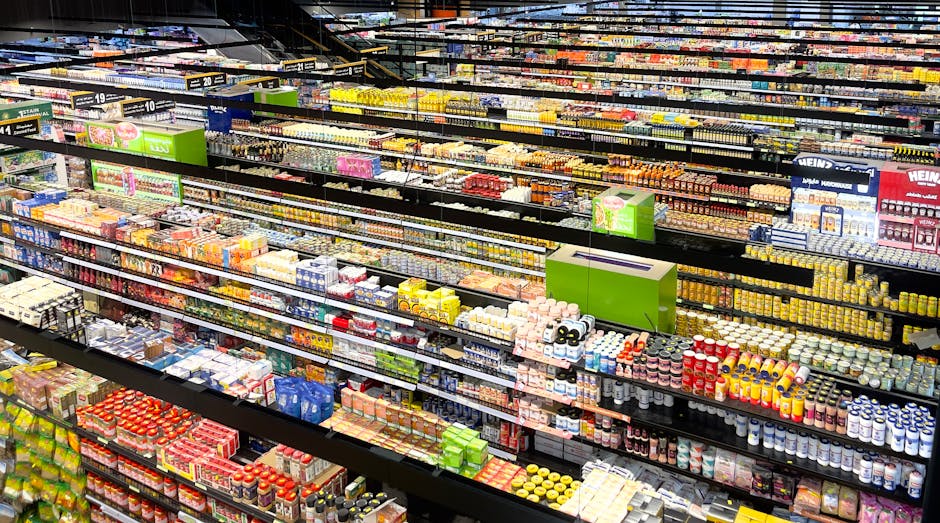Ever wandered the grocery aisles wondering if that shiny packaging actually means good quality? Spoiler alert: it often doesn’t.
We all want to eat well without breaking the bank or sacrificing our health. But some common grocery items sneakily do more harm than good.
Knowing what to avoid can save you money, improve your well-being, and make your grocery trips less stressful.
This list isn’t about being perfect—it’s about making smarter choices that add up over time.
Ready to shop smarter and feel better about what’s in your cart? Let’s dive in!
Here are 25 grocery store items you should always avoid, grouped into five eye-opening categories.
Processed and Packaged Snacks
Processed snacks are everywhere, tempting us with convenience and bright colors. Unfortunately, many of these items are loaded with unhealthy fats, excess salt, and hidden sugars that can undermine your health.
While grabbing a quick snack isn’t a crime, it’s important to know which items are better left on the shelf. Avoiding certain processed snacks can significantly reduce your intake of artificial ingredients and empty calories.
Here are five processed snacks that are best avoided for your health and waistline.
1. Flavored Potato Chips – Those tempting bags of flavored chips might be tasty, but they’re often packed with unhealthy trans fats, artificial flavorings, and excessive sodium. These ingredients can increase your risk of heart disease and contribute to bloating and water retention.
2. Pre-packaged Cheese Puffs – Loaded with artificial colors and preservatives, cheese puffs offer little nutritional value. The high fat and salt content can also spike your blood pressure and lead to cravings that make you overeat.
3. Microwave Popcorn with Artificial Butter – Although convenient, many microwave popcorn brands contain chemicals like diacetyl and PFOAs linked to respiratory issues and other health concerns. Opting for plain kernels and air-popping is a safer bet.
4. Pre-packaged Snack Cakes – These sweet treats are often filled with trans fats, high fructose corn syrup, and artificial preservatives. They provide a sugar rush but no lasting energy or nutrition, making them a poor snack choice.
5. Fruit Snacks with Added Sugar – Marketed as healthy, fruit snacks usually contain high amounts of added sugars and artificial flavors. They lack real fruit fiber and can contribute to tooth decay and blood sugar spikes.
Now that we know what processed snacks to skip, let’s explore other grocery items that might be lurking in your cart.
Beverages That Pack a Hidden Punch
Drinks can be deceiving. Some seem harmless or even healthy but hide a ton of sugar, artificial ingredients, or caffeine that can disrupt your body’s natural balance.
Choosing what to drink is just as important as what to eat, especially if you’re trying to maintain energy, avoid unnecessary calories, or keep your hydration on point.
Here are five beverages you should think twice about before buying.
6. Sugary Energy Drinks – These are often loaded with caffeine and sugar, which can cause jitters, anxiety, and energy crashes. Long-term consumption may also increase heart risks and disrupt sleep patterns.
7. Store-bought Fruit Juice Cocktails – Often labeled “fruit juice,” these drinks typically contain only a small percentage of real juice and a lot of added sugars and preservatives. They offer little fiber and can spike your blood sugar quickly.
8. Flavored Bottled Water – Although marketed as a healthy choice, many flavored waters contain artificial sweeteners, colors, and chemicals that may affect gut health and cause cravings.
9. Regular Soda – A classic culprit, soda is packed with high fructose corn syrup and empty calories. Regular consumption is linked to obesity, type 2 diabetes, and dental problems.
10. Sweetened Iced Teas – These often have as much sugar as sodas, along with artificial flavors and colorings. Drinking them regularly can contribute to weight gain and insulin resistance.
With beverages cleared out, let’s turn to the freezer aisle and the hidden traps it holds.
Frozen Foods and Convenience Meals
Frozen meals and convenience foods promise quick, easy dinners, but many are loaded with sodium, preservatives, and unhealthy fats. These hidden ingredients can sabotage your health goals without you realizing it.
While not all frozen foods are bad, being selective and reading labels can make a huge difference in what you bring home.
Here are five frozen or convenience items you should avoid for a healthier kitchen.
11. Frozen Dinners with Preservatives – These meals often contain high sodium levels and additives to prolong shelf life, which can increase blood pressure and cause bloating. They also tend to be low in fresh vegetables and fiber.
12. Frozen Breaded Foods – Items like breaded chicken nuggets or fish sticks are often deep-fried before freezing. This adds unhealthy fats and extra calories, making them less nutritious than fresh alternatives.
13. Frozen Pizza with Processed Meats – Loaded with saturated fats, preservatives, and excess sodium, these pizzas can contribute to heart disease risk if eaten regularly. The processed meats also contain nitrates, which are linked to certain cancers.
14. Pre-made Frozen Breakfast Sandwiches – These are typically high in sodium, saturated fats, and processed cheese, with minimal fresh ingredients. They often leave you feeling sluggish rather than energized.
15. Frozen Fries with Added Coatings – Some frozen fries are coated with extra starches and preservatives, increasing calorie content and potentially causing digestive issues. Homemade oven-baked fries are a healthier alternative.
Having covered frozen foods, let’s move on to another category where many shoppers are caught off guard: condiments and sauces.
Condiments and Sauces to Skip
Condiments and sauces are flavor boosters, but many hide sugar, unhealthy fats, and preservatives that can turn a healthy meal into a nutritional nightmare.
They may seem like small additions, but those calories and additives add up quickly and often go unnoticed.
Here are five common condiments and sauces you should avoid or use sparingly.
16. Regular Ketchup – While it contains tomatoes, ketchup is usually loaded with added sugar and high fructose corn syrup. This can lead to blood sugar spikes and contribute to weight gain.
17. Mayonnaise with Unhealthy Oils – Many commercial mayonnaises use soybean or corn oils high in omega-6 fatty acids, which can promote inflammation when consumed excessively.
18. Barbecue Sauce – Often packed with sugar, artificial flavors, and preservatives, barbecue sauce can turn a healthy grilled meal into a sugary one. Reading labels to find low-sugar versions is key.
19. Salad Dressings with Hidden Sugars – Creamy dressings like ranch or thousand island often contain added sugars and unhealthy fats. Opting for olive oil and vinegar is a better choice for your heart and waistline.
20. Soy Sauce with High Sodium – Traditional soy sauce is very high in sodium, which can elevate blood pressure and cause water retention. Look for low-sodium alternatives or use sparingly.
From sauces, we move finally to a category that many overlook: breakfast items.
Breakfast Staples That Aren’t So Staple
Breakfast is often called the most important meal of the day, but some common breakfast foods are surprisingly unhealthy. They can be loaded with sugar, refined carbs, and artificial ingredients that leave you tired and hungry soon after eating.
Choosing better breakfast options sets the tone for your whole day, so it’s worth avoiding these common pitfalls.
Here are five breakfast items to skip for a more balanced start.
21. Flavored Instant Oatmeal Packets – These often contain added sugars and artificial flavors that negate oatmeal’s natural health benefits. Plain oats with fresh fruit are a smarter choice.
22. Pre-packaged Breakfast Cereals – Many cereals are heavily processed and packed with sugar, artificial colors, and preservatives. They can cause energy crashes and don’t keep you full.
23. Store-bought Muffins – Loaded with sugar, refined flour, and unhealthy fats, these muffins are more dessert than breakfast. Baking your own with wholesome ingredients is a healthier alternative.
24. Sweetened Yogurt Cups – These often contain more sugar than a candy bar. Choosing plain yogurt and adding your own fruit keeps sugar levels in check.
25. Breakfast Bars with Added Sugar – Marketed as healthy and convenient, many breakfast bars are little more than candy bars in disguise. Reading labels carefully can help you avoid these sugar traps.
With these breakfast pitfalls in mind, you’re better equipped to make choices that nourish your body from the start of the day.
Now that you know which items to avoid, your grocery trips can become more intentional and healthful.
Remember, avoiding these 25 items is about progress, not perfection. Small changes add up to big health improvements.
Feel empowered to read labels, trust your instincts, and share these tips with friends and family for healthier shopping together.



